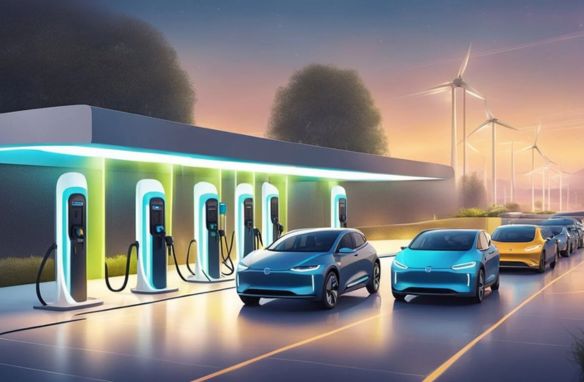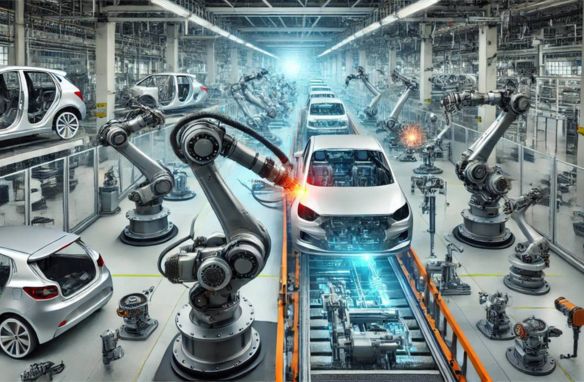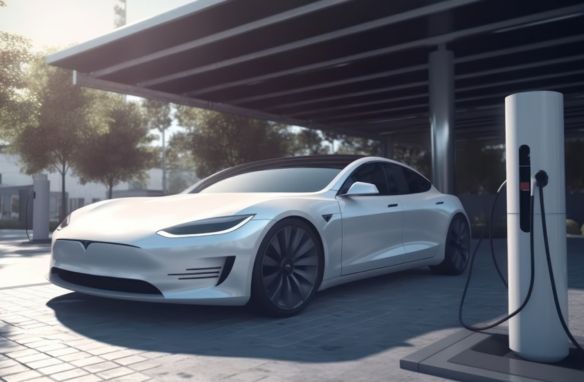Electric vehicles (EVs) have been steadily revolutionizing the automotive world. What was once seen as a niche for environmentally conscious consumers has now entered the mainstream, reshaping the entire industry. With advances in technology, increasing environmental awareness, and strong governmental support, EVs are driving significant shifts in manufacturing, consumer behavior, and global infrastructure. Let’s take a closer look at how electric vehicles are changing the automotive landscape.
A Shift in Manufacturing and Design

EVs require different components than traditional internal combustion engine (ICE) vehicles. Battery packs, electric motors, and complex electronics replace conventional engines, fuel systems, and exhausts. This shift means:
- Redesigned Factories: Auto manufacturers have restructured their factories to build EVs efficiently. Companies like Ford and General Motors have dedicated significant resources to create EV-specific manufacturing plants.
- New Supply Chains: The demand for lithium, cobalt, and other materials essential for batteries has surged, creating new global supply chains.
- Vehicle Architecture: The unique requirements of EVs have led to innovations in car design, such as more spacious interiors and simplified engineering that optimizes weight distribution and aerodynamics.
Environmental Impact and Sustainability

EVs emit no tailpipe emissions, which has a direct positive impact on air quality. Additionally:
- Reduction in Greenhouse Gases: Over their lifetimes, EVs contribute significantly less to greenhouse gas emissions than ICE vehicles, especially as renewable energy sources grow.
- Battery Recycling Innovations: Efforts are underway to recycle EV batteries, reducing the environmental impact of battery production and disposal.
- Cleaner Manufacturing Practices: Automakers are implementing green practices in EV production, such as using renewable energy in factories and sourcing eco-friendly materials for interiors.
Changing Consumer Behavior

The growing variety of EV models, from luxury to budget-friendly options, has broadened their appeal. Key trends include:
- Range Anxiety Reduction: With EV ranges now surpassing 300 miles on a single charge, consumer confidence is increasing.
- Government Incentives: Subsidies, tax credits, and rebates make EVs more affordable, encouraging more people to consider electric over gasoline.
- Shifting Ownership Models: Many consumers now explore EV leasing, car-sharing, and subscription services to access EVs without a long-term commitment.
Infrastructure Development

The rise of EVs has driven a need for a vast network of charging stations, especially fast chargers along highways and in urban centers:
- Charging Networks: Companies like Tesla, Electrify America, and ChargePoint are expanding charging networks worldwide, making charging more accessible.
- Public and Private Investment: Governments and private firms are investing billions in EV infrastructure, aiming to reduce charging times and increase charging station availability.
- Home Charging Advancements: EV owners are increasingly opting for home charging solutions, with faster Level 2 chargers making overnight charging convenient and cost-effective.
Boosting Innovation in Technology

EVs have sparked a wave of technological innovation, leading to developments such as:
- Battery Advances: Research in battery chemistry has led to longer-lasting, faster-charging, and less resource-intensive batteries.
- Regenerative Braking: EVs use regenerative braking to recharge batteries while driving, enhancing efficiency.
- Autonomous Driving Compatibility: EVs are at the forefront of autonomous driving research, as many electric platforms can integrate with AI-based driving systems and sensors more easily than traditional vehicles.
The Rise of New Competitors

EVs have opened doors for new players in the automotive market, from tech giants to specialized EV startups:
- Tech Companies Entering the Field: Companies like Apple and Google have explored EV production and self-driving technology, potentially challenging traditional automakers.
- Rise of Startups: Tesla’s success has inspired numerous startups, such as Rivian, Lucid Motors, and NIO, each offering unique electric models and targeting niche markets within the EV space.
- Legacy Automakers Adapting: Traditional auto brands like Ford, Volkswagen, and Toyota are ramping up their EV portfolios, recognizing the need to keep pace with consumer demand and meet emission targets.
Economic Implications and Job Market Shifts

As the industry transforms, so do job requirements, with a growing emphasis on skills related to EV production, battery technology, and software development:
- New Job Opportunities: The EV boom has led to new jobs in battery production, EV charging infrastructure, and software development.
- Reskilling of Traditional Workforce: Workers in traditional manufacturing are increasingly reskilled for EV assembly lines and battery production.
- Investment in Research: Companies and governments alike are investing heavily in EV-related research and development, driving economic growth in high-tech sectors.
Conclusion
Electric vehicles are not just changing what people drive; they are transforming the entire automotive ecosystem. From reimagined manufacturing processes to cleaner environmental practices and extensive infrastructure developments, EVs are setting new standards for innovation, sustainability, and convenience in transportation. The ripple effects of these changes will continue to shape the future of mobility, economy, and environmental stewardship as electric vehicles become a staple on roads worldwide.


